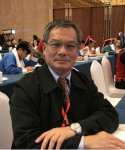
Prof. Tungchiou Huang
Fo Guang University,Ph. D in National Centre for Language and Literacy, Chinese Taipei
Title: The Alternative of Positive Multilingual Environments Through Translingualism in a Multicultural world
Abstract:
Translingualism is a process of empowerment, and this empowerment of us in our daily life might produce an environment that fosters maturity and responsibility (Steven G. Kellman 2000; Huang 2017). Diversity of race, language, culture, ethnicity, social class, and religion is a fundamental feature of interpersonal interactions and community structures. Life on earth is an encounter with the blending of culture and nature, as well as different languages and cultures, and such kind of the circumstances have forced everyone to learn from each other in order to form positive heterogenous relationships with people from various cultural backgrounds.
The aim of this study is to indicate that the theme of translingualism is the notion of interdependence of languages and the transfer of the skills (Huang 2010, 2015, 2016). What I meant is that it is possible to for one everywhere to be able to speak several languages at a time. Speaking community languages well makes one lead a joyful life or more employable. To achieve this aim, I have been sharing in my experiences of being multilingual in a multilingual daily life by applying the approach of action research to learn several different languages at a time (Edwards & Ngwaru 2011; Jandt 2005; Lindholm 1994).
The phenomenological method was also been employed in my study, using natural and qualitative description just because phenomenological method makes possible “a descriptive account of the essential structures of the directly given.” The result of this study must be of enormous value to most of the peoples who would like to become multilingual, for it indicates that being multilingual means cultivating eternal capacity for the language learning.
Biography:
The largest community of minorities in Taiwan is the Amis ethnicity, and with a population of over 208,525 in 2017, they form over 38% of the 16 different aboriginal peoples living on the Taiwan Island and Orchid Isle. I belong to this ethnicity, born on October 18, 1954. My native name is Akiyo Pahalaan, and my Chinese name is Huang, Tung-Chiou. As I grew up in a multicultural environment, I speak aside from my native language, Hoklo (one of the majority languages in Taiwan), Mandarin Chinese, Japanese, and English.
All teachers at all levels of Taiwan’s schools, I believe, should be prepared to teach in a multiethnic classroom environment, and be able to help students to cope with multiethnic situations in positive and fruitful ways. Citizens of Taiwan must learn to respect and understand the ethnic communities of which they are not members as well; consequently, this has made me perform the above conditions and values the central consideration of my professional teaching and academic work for over 45 years. I am a native speakers of Amis ethnicity and an expert on “Translingualism”.
The following books are the masterpieces of my research: “LALENGAWAN”- Language Revitalisation, “FUCACING”- English-Mediated Orthography, and “PARANAAN”- Let Our Mother Tongues Be Part of Our Daily Lives. Since then I focus my study on “Translingualism,” examining how the students in a community of Taiwan hailing from different cultural backgrounds and attending multilingual classrooms that promoted bi/multilingualism can come to value all languages spoken in a community. In 2017, I published the result of my study “Translingualism: The True Beauty of Taiwan.” At present, I have made my full contribution to an ongoing group for developing RA-A Approach to activate and cultivate students’ interest in learning several diverse languages at a time.